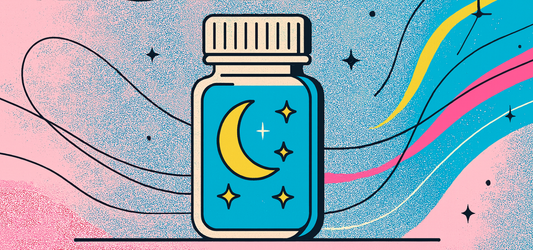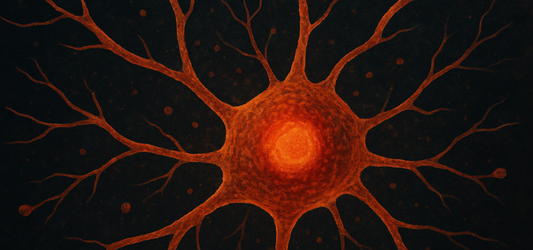The Journal

New study shows artificial sweeteners may accel...
One daily diet soda equated to 1.6 extra years of cognitive aging over eight years.
New study shows artificial sweeteners may accelerate cognitive decline
One daily diet soda equated to 1.6 extra years of cognitive aging over eight years.

Why gut health may cure insomnia better than sl...
Gut bacteria produce 90% of your body's serotonin, the precursor to sleep-inducing melatonin.
Why gut health may cure insomnia better than sleep meds
Gut bacteria produce 90% of your body's serotonin, the precursor to sleep-inducing melatonin.

13 essential minerals you need for optimal cogn...
Modern soil depletion may create mineral gaps that whole foods alone can't fill.
13 essential minerals you need for optimal cognitive function
Modern soil depletion may create mineral gaps that whole foods alone can't fill.

5 science-backed ways dark chocolate supports b...
Quality matters more than quantity—70% cacao content maximizes bioactive compound concentration.
5 science-backed ways dark chocolate supports brain and gut health
Quality matters more than quantity—70% cacao content maximizes bioactive compound concentration.

How GABA supplementation supports a healthy str...
Your brain's primary inhibitory neurotransmitter acts as a "brake" on overactive neural circuits.
How GABA supplementation supports a healthy stress response and better sleep
Your brain's primary inhibitory neurotransmitter acts as a "brake" on overactive neural circuits.

How to safely supplement with melatonin for sus...
Environmental factors can either enhance or completely undermine melatonin's sleep-promoting effects.
How to safely supplement with melatonin for sustainable sleep quality
Environmental factors can either enhance or completely undermine melatonin's sleep-promoting effects.

Cognitive benefits of hydrogen water explored i...
Molecular hydrogen selectively targets harmful free radicals without disrupting beneficial cellular processes.
Cognitive benefits of hydrogen water explored in new study
Molecular hydrogen selectively targets harmful free radicals without disrupting beneficial cellular processes.

These popular food additives may be shortening ...
Artificial flavors and coloring agents showed the strongest mortality associations in 266,000 participants.
These popular food additives may be shortening your lifespan
Artificial flavors and coloring agents showed the strongest mortality associations in 266,000 participants.

4 evidence-based longevity strategies you can s...
Small, consistent interventions targeting metabolism and cellular repair compound over decades.
4 evidence-based longevity strategies you can start today
Small, consistent interventions targeting metabolism and cellular repair compound over decades.

10 magnesium types and which one works best for...
From sleep support to cognitive enhancement, each form targets different physiological pathways.
10 magnesium types and which one works best for your health goals
From sleep support to cognitive enhancement, each form targets different physiological pathways.

Where nutrition assessment tools fall short
Current tools treat aging adults as one group despite varying needs for diabetes, heart disease, and cognitive decline.
Where nutrition assessment tools fall short
Current tools treat aging adults as one group despite varying needs for diabetes, heart disease, and cognitive decline.

How to optimize caffeine consumption for better...
Strategic timing and L-theanine pairing unlock sustained focus without afternoon crashes.
How to optimize caffeine consumption for better cognitive performance
Strategic timing and L-theanine pairing unlock sustained focus without afternoon crashes.

How the SF Giants are leading the charge for me...
Professional sports organizations discover mental health support creates competitive advantages beyond player wellbeing.
How the SF Giants are leading the charge for mental wellness in sports
Professional sports organizations discover mental health support creates competitive advantages beyond player wellbeing.

What are 'glial cells' and why are they so impo...
Supporting glial cell health could prevent cognitive decline before neurological symptoms even appear.
What are 'glial cells' and why are they so important to brain health?
Supporting glial cell health could prevent cognitive decline before neurological symptoms even appear.

This new AI-blockchain platform could accelerat...
Early testing caught critical dosing issues that would have taken human researchers weeks to identify.
This new AI-blockchain platform could accelerate anti-aging drug discoveries
Early testing caught critical dosing issues that would have taken human researchers weeks to identify.

How maternal mental health translates to your baby
Maternal cortisol levels directly influence infant stress response systems through breast milk transmission.
How maternal mental health translates to your baby
Maternal cortisol levels directly influence infant stress response systems through breast milk transmission.

Neurologists say these 3 drinks are damaging yo...
Diet sodas contain aspartame compounds that may interfere with neurotransmitter function over time.
Neurologists say these 3 drinks are damaging your brain
Diet sodas contain aspartame compounds that may interfere with neurotransmitter function over time.

8 vitamin B12 deficiency warning signs women of...
Symptoms develop gradually over months, making them easy to dismiss as everyday stress.
8 vitamin B12 deficiency warning signs women often ignore
Symptoms develop gradually over months, making them easy to dismiss as everyday stress.

This new AI-powered wearable may detect early s...
Heart rate variability and sleep patterns reveal stress before you feel overwhelmed.
This new AI-powered wearable may detect early symptoms of poor mental health
Heart rate variability and sleep patterns reveal stress before you feel overwhelmed.

6 science-backed mental wellness benefits of va...
Research suggests 300-900mg taken 60-90 minutes before bedtime optimizes sleep benefits.
6 science-backed mental wellness benefits of valerian root
Research suggests 300-900mg taken 60-90 minutes before bedtime optimizes sleep benefits.

Why hot weather workouts can trigger dangerous ...
Even non-diabetic athletes can experience dangerous glucose drops when combining physical activity with high temperatures.
Why hot weather workouts can trigger dangerous blood sugar crashes
Even non-diabetic athletes can experience dangerous glucose drops when combining physical activity with high temperatures.
